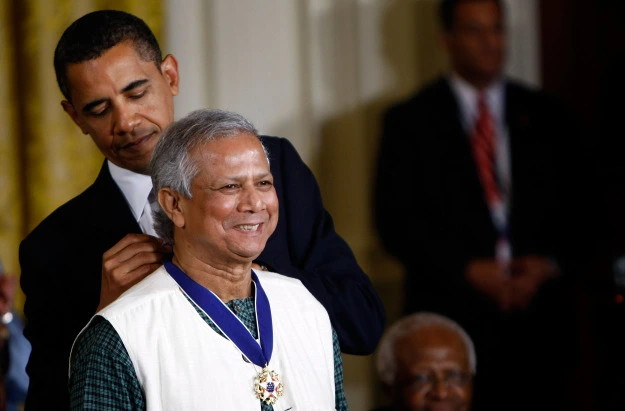Even though the two countries have maintained a bilateral relationship, the United States, under three different presidents, has always been critical of Sheikh Hasina’s Awami League for some of her major political decisions that hurt US interests related to Grameen Bank founder Dr Muhammad Yunus, the trial of war criminals linked to Jamaat-e-Islami, the hanging of Bangabandhu’s killers and demanding that all fugitive convicts be repatriated, the abolition of the Caretaker Government provision and return of secularism in the Constitution, refusal to award gas and oil blocks as per demands, and maintaining a close bond with China and Russia.
On May 10, 2009, Dr Yunus spoke with US Ambassador to Bangladesh James F Moriarty and asked for the US government’s help to urge Prime Minister Sheikh Hasina to change a long-standing rule that gives the Government of Bangladesh (GOB) control over his position as Grameen Bank chairman. The Caretaker Government passed an ordinance removing the government’s authority to select the bank chairman, but the Parliament has not yet ratified that ordinance. The ambassador pledged to assist Dr Yunus in obtaining a meeting with the PM and in arguing on his behalf with the prime minister and her advisers. Dr Yunus also discussed with the ambassador his disappointment over the new Awami League government. He said the new government had to focus on the nation’s power needs and improve the quality of government bureaucracy in order for Bangladesh to weather the current economic turmoil.
The ambassador called on Dr Yunus as a follow-up to the US Secretary of State’s meeting with Dr Yunus in Washington in April. Dr Yunus outlined in greater detail concerns he had raised with the Secretary regarding relations between the government and Grameen Bank.
Over the years, Dr Yunus told the ambassador, he had applied repeatedly to the government to amend the rules regarding the selection of the chairman. During the Caretaker Government, he was successful in persuading them to amend the Grameen Bank Ordinance so the government no longer had the authority to appoint the bank’s chairman. When Sheikh Hasina’s Awami League formed a new government, Dr Yunus urged the government to approve the ordinance. Despite strong support from several cabinet ministers, the prime minister refused to approve the legislation.
When Dr Yunus requested US assistance with his efforts to have the prime minister reverse her decision, the envoy wanted to know whether he had met her in person. In response, Dr Yunus said he had thus far only spoken with the members of the PM’s cabinet and not with the prime minister herself. The ambassador recommended Dr Yunus seek a meeting with the PM as a first step in advocating she approve the amendment to the Grameen Bank legislation. He also pledged to assist Dr Yunus in obtaining the meeting and in urging the prime minister to change the Grameen Bank legislation.
The ambassador and Dr Yunus went on to discuss more generally the prime minister’s performance during her first four months in office. Dr Yunus was critical of the prime minister’s actions to strengthen central government at the expense of local government. He also criticized the Awami League government for exacting petty retributions against the opposition BNP and Khaleda Zia. “This is a divisive strategy,” Dr Yunus said. The prime minister “must build bridges.”
According to Dr Yunus, the new government leadership must also address the nation’s power crisis and improve the quality of government bureaucracy in order to keep Bangladesh on its development path. If the government and business can begin to meet the nation’s immense power needs, then the rest of the economy will continue to grow, he said. With regard to the quality of governance, Dr Yunus observed that the government desperately needed professional civil servants who had the expertise to manage their portfolios and who were not subject to the whims of politics.
Moriarty observed that despite, or perhaps because of, Dr Yunus’ international reputation, many among Bangladesh’s political elite regarded him with suspicion. Sheikh Hasina and others likely view his achievements and stature as a threat to their authority; his very brief attempt to establish a political party is proof of an alleged desire to usurp Bangladesh’s long-time leaders, including the prime minister. Using this logic, then, it is not surprising the prime minister wishes to retain a lever of power over the Grameen Bank chairman.
Dr Yunus and his supporters, including the United States, need to convince the prime minister that an independent Grameen Bank is in her interest. “We will emphasize that an independent Grameen Bank can support the PM’s stated desire to further alleviate poverty in Bangladesh, and that Yunus as an independent bank chairman can enhance her standing on the world stage. We will work with Yunus to make these points with the Prime Minister and her advisers. We will also note the potential negative consequences of any attempt to sideline such an internationally respected figure as Muhammad Yunus.”


Leave a Reply
You must be logged in to post a comment.